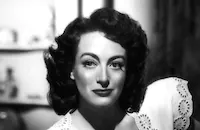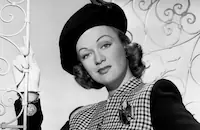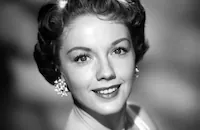Goodbye, My Fancy

Brief Synopsis
Cast & Crew
Vincent Sherman
Joan Crawford
Robert Young
Frank Lovejoy
Eve Arden
Janice Rule
Film Details
Technical Specs

Synopsis
When United States Congresswoman Agatha Reed is notified that she will be awarded an honorary degree by Good Hope College for Women, from which she was expelled twenty years earlier for staying out all night, she immediately puts aside her busy schedule and dictates a letter of acceptance to her secretary, Woody. Agatha has fond memories of her romance with college president Dr. James Merrill, when she was a student and he was her professor, and wants to see if there is still a spark between them. Later, as she is packing, Agatha is surprised by Life photographer Matt Cole, whom she has not seen since she stood him up five years earlier in Paris when they were both war correspondents. Matt wants to rekindle their romance, and when Agatha discourages him, he decides to assign himself to cover her visit to Good Hope. At the college, Agatha is greatly moved by the sight of her former dormitory room and by the greeting of her dizzy former roommate, Ellen, who is married to influential college trustee Claude Griswold. Merrill's daughter, graduating senior Virginia, is also among Agatha's admirers, and from her, Agatha learns that Merrill is a widower. When Ginny discovers that her father had been Agatha's history professor, she hesitantly asks what kind of teacher he was, and then speaks warmly of her physics professor, Dr. Pitt, who challenges the students to expand their interests outside the narrow confines of the college. After Agatha is formally greeted by a reception committee, Merrill, who had proposed to Agatha the night before she was expelled, asks her privately why she disappeared without telling him, and she explains her fears that the scandal of his marrying a student would have ruined his career. Later, Agatha admits to Woody that she would marry Merrill immediately if he proposed. To Agatha's displeasure, Matt arrives at the college and meets his rival for her affections. Later, Pitt tells Matt that he will soon be leaving the school because Griswold disapproves of his teaching techniques, but promises a parting display of "fireworks" on Saturday morning. Ginny then begs Agatha to intervene on Pitt's behalf, and she agrees to meet with him. Pitt explains that Griswold fears open discussion and disapproves of his efforts to inform students about the world's problems. When Agatha advises him to fight for his principles, he replies that Merrill would never support him. This does not fit Agatha's memories of Merrill, and that night when he proposes again, she readily accepts. Meanwhile, Matt tells Woody that he fell in love with Agatha when they were both covering the liberation of Paris. He had intended to propose one night, but she did not keep the date. He then waits outside for Agatha to return, only to learn that she has become engaged. Determined to show Agatha that she is in love with a dream, Matt does some investigating and learns that a film Agatha made about the dangers of restricting intellectual freedom will be shown on Saturday. Intending to show her how backward the college is, Matt tells the reactionary Griswold about the film, and he immediately forces Merrill to cancel the showing. A tearful Ginny tells Agatha that she is ashamed of the compromises her father has made since he has become president. Later, Agatha argues passionately for her film and is stunned when Merrill will not stand up to Griswold. Angrily, she asks him by what right a trustee is allowed to make academic decisions and then reveals Ginny's feelings about him. When Merrill still maintains his position, Agatha insists that he show the film and in exchange, promises that she will never reveal the circumstances of her expulsion. Thus coerced, Merrill agrees. Deeply disappointed, Agatha starts packing, and Merrill accuses her of running away just as she did twenty years earlier. While they are quarreling, Ginny bursts into the room to thank her father for showing the film. When Agatha does not tell Ginny the truth behind the decision, Merrill does, and to his surprise, his honesty is lovingly accepted by his daughter. Agatha then learns that Merrill, understanding the truth of her charges, has resigned his position. She begs him to withdraw the resignation, and he then restates his love for her. She responds that under different circumstances, she might have reconsidered, but she realizes that she loves another man. Matt then returns, Agatha admits that he was right about Merrill, and they embrace.

Cast

Joan Crawford

Robert Young

Frank Lovejoy

Eve Arden
Janice Rule
Lurene Tuttle

Howard St. John
Viola Roache

Ellen Corby
Morgan Farley

Virginia Gibson

John Qualen
Ann Robin
Mary Carver
Creighton Hale
Tony Merrill

James Griffith
Jay Merrick
Frank Mcfarland

John Alvin
Eddie Johnson
Frank Conlon
John Hedloe
Harlan Briggs
George Bunny
Billy Mcclean
Janet Stewart
Charles Conrad
Phil Tead
Isabel Withers
Lucius Cook
Fredrick Howard

Larry Williams
Glen Turnbull
Frank Hyer
Crew

Videos
Trailer
Hosted Intro
Film Details
Technical Specs

Articles
Goodbye, My Fancy
The film was based on the stage play of the same name by Fay Kanin which had starred Madeleine Carroll as a congresswoman who is given a degree by the University who expelled her years before for having a fling with a young professor. The congresswoman returns to the school because the young professor is now the president. They are reunited and the attraction reignites. Warner Bros. took out the strongest political elements and cast Crawford as the center of a love triangle, with the other two sides played by Robert Young and Frank Lovejoy (perhaps best known for his radio show Nightbeat) as a reporter who is desperately in love with Crawford.
Also in the cast was Janice Rule and Crawford's Mildred Pierce (1945) co-star Eve Arden who said, "The part was the usual secretary-friend of the heroine but with great lines." Goodbye, My Fancy was Rule's first official film role (she had an uncredited bit part in Fourteen Hours, 1951) and it was a baptism of fire. Not only was she beautiful, Rule had proved herself on television and the New York stage and was naturally attracting attention from the press as well as the crew. It added up to a triple threat and Crawford, entering middle age, was not happy about it. She took to harassing Rule for not hitting her marks (walking to the chalk marks on the floor indicating where she should stand), "You're wasting a lot of time and money." This made Rule very nervous and upset and she kept blowing her lines, prompting Crawford to say, "Miss Rule, you'd better enjoy making films while you can. I doubt that you'll be with us long."
Jealous actresses were not the only problem on the set. Director Vincent Sherman received a blistering memo from studio head Jack Warner about running over budget. "After talking to you on the telephone last night, Friday, I am depending on you to finish the picture by next Saturday, November 18th [1950]. As I told you, other companies are making the same type of picture in 21-28-36 days with important casts. As you know, Metro [-Goldwyn-Mayer] made Father's Little Dividend (1951), with Spencer Tracy, Elizabeth Taylor and Joan Bennett in 21 days and I am sure the Director had the same problems you have had. You will just have to do this. Otherwise, we cannot stand off this type of cost and delay in making a picture. Those days are gone and no one is going to stay on the team unless they can carry the ball. Get in there and finish the picture by next Saturday or before and stop trying for perfection. No one is interested but yourself and I am sure you are not going to pay to see the picture."
Despite the problems, Sherman, who made three films with Crawford said later, "She was a real pro, she was marvelous to work with - for any director. She knows her job. You don't have to tell her where to look to hit the light, and if you give her reasons why you're doing a thing, that's all right. You explain to her what you want done, why you want it done, that's it. She will sometimes make a suggestion - what you have to watch with her is also what you do with [Bette] Davis, that it doesn't get too much. But apart from that...Very rarely you have to say to Joan it's not enough. Mostly what you have to say is it's a little too much, play it down a bit." Crawford, for her part, praised Sherman, "When I first read the script, I thought [Jack] Warner was offering me the picture because he couldn't get either Kate Hepburn or Roz Russell for the part. I still think they could have done this sort of sophisticated political comedy better than I did. But Vince Sherman, the director, made sure I did a pretty good job. All the credit for bringing it off belongs to him."
Critical reaction to Goodbye, My Fancy varied. Variety called the performances, "very sick under Vincent Sherman's direction. Miss Crawford, recently involved in only heavily dramatic roles, sustains the romantic, middle-aged congresswoman with a light touch that is excellent." However, Bosley Crowther in the New York Times wrote, "Joan Crawford is working extra hard to make romance and liberalism attractive in the Warner's film version [of the play]. And when Miss Crawford makes a mighty effort to do what she obviously regards as a significant piece of performing, the atmosphere is electrically charged. At least, it is loaded with tension--or a reasonable facsimile thereof--when Miss Crawford herself is posing or parading within the camera's range."
Producer: Henry Blanke
Director: Vincent Sherman
Screenplay: Ben Roberts, Ivan Goff (writer); Fay Kanin (play)
Cinematography: Ted McCord
Art Direction: Stanley Fleischer
Music: Ray Heindorf (uncredited)
Film Editing: Rudi Fehr
Cast: Joan Crawford (Agatha Reed), Robert Young (Doctor James Merrill), Frank Lovejoy (Matt Cole), Eve Arden (Woody), Janice Rule (Virginia Merrill), Lurene Tuttle (Ellen Griswold), Howard St. John (Claude Griswold), Viola Roache (Miss Shackelford), Ellen Corby (Miss Birdshaw), Morgan Farley (Doctor Pitt).
BW-109m.
by Lorraine LoBianco
SOURCES:
Arden, Eve, Eve Arden, The Three Phases of Eve: An Autobiography
Belmer, Rudy Inside Warner Bros.
Crowther, Bosley, "Goodbye, My Fancy, With Joan Crawford and Robert Young, Opens at Holiday Theatre", The New York Times 30 May 51
Grost, Michael E. The Films of Vincent Sherman
Kobel, John People Will Talk
Newquist, Roy Conversations with Joan Crawford

Goodbye, My Fancy
Quotes
Trivia
Madeleine Carroll played the role of Agatha Reed on stage.
Notes
The title of the film is taken from the Walt Whitman poem "Good-bye My Fancy!," from which "Agatha" reads a selection. According to a New York Times article, in the original play, which was written before the U.S. military action in Korea, the film that Agatha brings to the college is an anti-war film. Believing this to be an inappropriate topic for the movie version of Goodbye, My Fancy, which was made during the Korean War, the screenwriters decided to focus on the issue of academic freedom under fascism and Communism. According to the article, director Vincent Sherman wanted to use the academic fight against loyalty oaths as the topic of Agatha's film, but the studio was opposed to the introduction of such "an inflammatory question." The article added that Warner Bros. paid $55,000 for the screen rights to the play.
Goodbye, My Fancy marked Janice Rule's film debut. A Hollywood Reporter news item stated that Jill Kraft, who appeared in the theatrical version of the play, had been signed for a part in the film, but her appearance in the released film has not been confirmed. The exterior college scenes were filmed at Occidental College in Los Angeles, CA. Robert Young, Frank Lovejoy and Lurene Tuttle reprised their roles in a Lux Radio Theatre broadcast of Goodbye, My Fancy on January 14, 1952, with Barbara Stanwyck in the role of Agatha. Another production was broadcast on June 28, 1953, starring Rosalind Russell and Robert Young.

Miscellaneous Notes
Released in United States 1951
Released in United States December 1996
Released in United States December 1996 (Shown in Los Angeles (American Cinematheque) as part of program "Contract Man: The Films of Vincent Sherman" December 6-14, 1996.)
Released in United States 1951
















